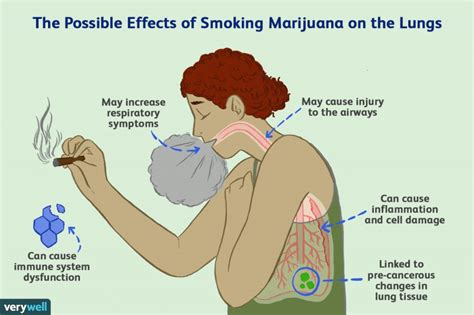Pot smokers have some reasons to be relieved according to a study published in 2012 by The Journal of the American Medical Association (JAMA). The study suggests that smoking up to one joint a day for seven years may not adversely affect lung function. However, it’s crucial to consider that smoking marijuana can lead to chronic bronchitis. “Any inhalation into the lungs can lead to airway changes,” Agrawal points out. A study from UCLA published in the Annals of the American Thoracic Society emphasized that regular marijuana smoking could damage the cilia in the large airways, highlighting the potential risks associated with smoking cannabis.

When it comes to vaping marijuana, the risks seem to increase. Boyd noted, “In short, it is all bad, but if you also vape cannabis, you have a greater number of unhealthy respiratory symptoms than if you just smoke cigarettes or marijuana, or vape e-cigarettes. Without a doubt, cigarettes and e-cigarettes are unhealthy and not good for lungs. However, vaping marijuana appears even worse.” This statement introduces a level of uncertainty and doubt about the safety of using marijuana, particularly when vaped.
Despite these concerns, marijuana has been a part of human culture for over 6000 years. Yet, it’s important to acknowledge that marijuana smoke shares many of the same toxins, irritants, and carcinogens found in cigarette smoke, which are contributors to heart disease and cancer. A comprehensive study led by UCSF and University of Alabama at Birmingham, which collected data from over 5000 U.S. adults for more than two decades, suggests that low to moderate use of marijuana may be less harmful to users’ lungs than exposure to tobacco. Nevertheless, this doesn’t erase the potential risks, especially regarding heart health.
Marijuana can cause the heart to beat faster and increase blood pressure, posing risks for individuals with heart disease. Research indicates that the risk of heart attack is several times higher in the hour after smoking marijuana. A link between marijuana use and atrial fibrillation has also been found. These findings highlight the potential cardiac risks associated with marijuana use, introducing an element of doubt regarding its safety, particularly for those with existing heart conditions.
Vaping, on the other hand, involves heating a liquid until it turns into a vapor to be inhaled. This method is used with devices such as e-cigarettes, mods, e-hookahs, sub-ohms, tank systems, and vape pens. Though it’s a popular alternative to smoking, the long-term effects on lung health are not entirely understood, and preliminary data suggests potential harm.
In conclusion, while some studies suggest that moderate marijuana use may have less impact on the lungs compared to tobacco, it is undeniable that it can lead to chronic bronchitis and other respiratory issues. Additionally, marijuana use has potential heart-related risks and its vaping seems to be even more harmful to respiratory health. This leaves us with an ongoing debate and a level of uncertainty regarding the true impact of marijuana on our health.
Harvard Health on Pot Smokers
Northwell Health on Marijuana and Lungs
Vaping Marijuana and Lung Damage
Marijuana and Heart Health
UCSF on Marijuana and Lung Health
Harvard Health on Marijuana and Heart Risks
Harvard Health on Vaping
Harvard Health on Marijuana’s Effects on the Heart
Science in Our World: Marijuana and Your Lungs
UAB on Marijuana Smoke and Lungs